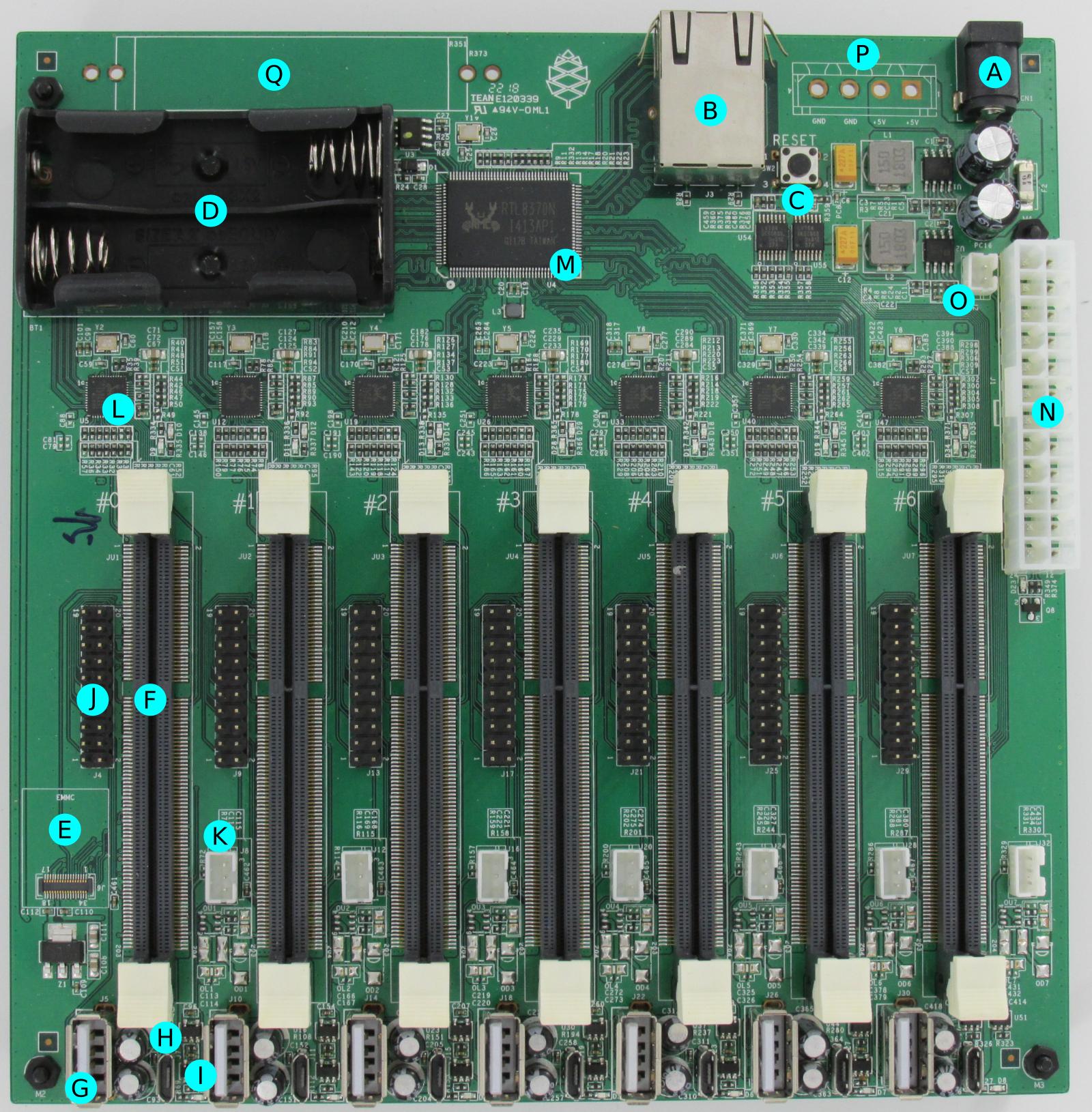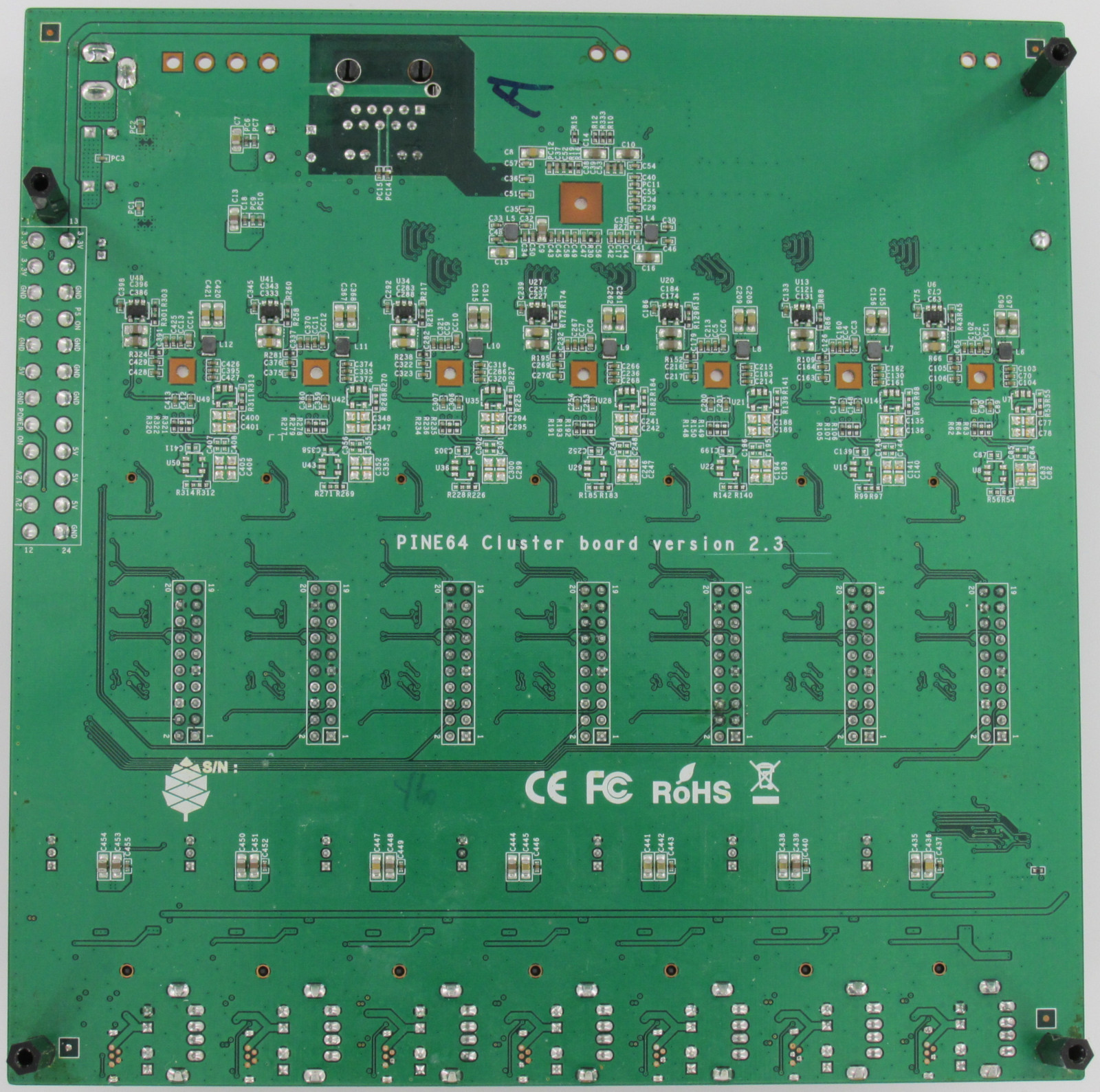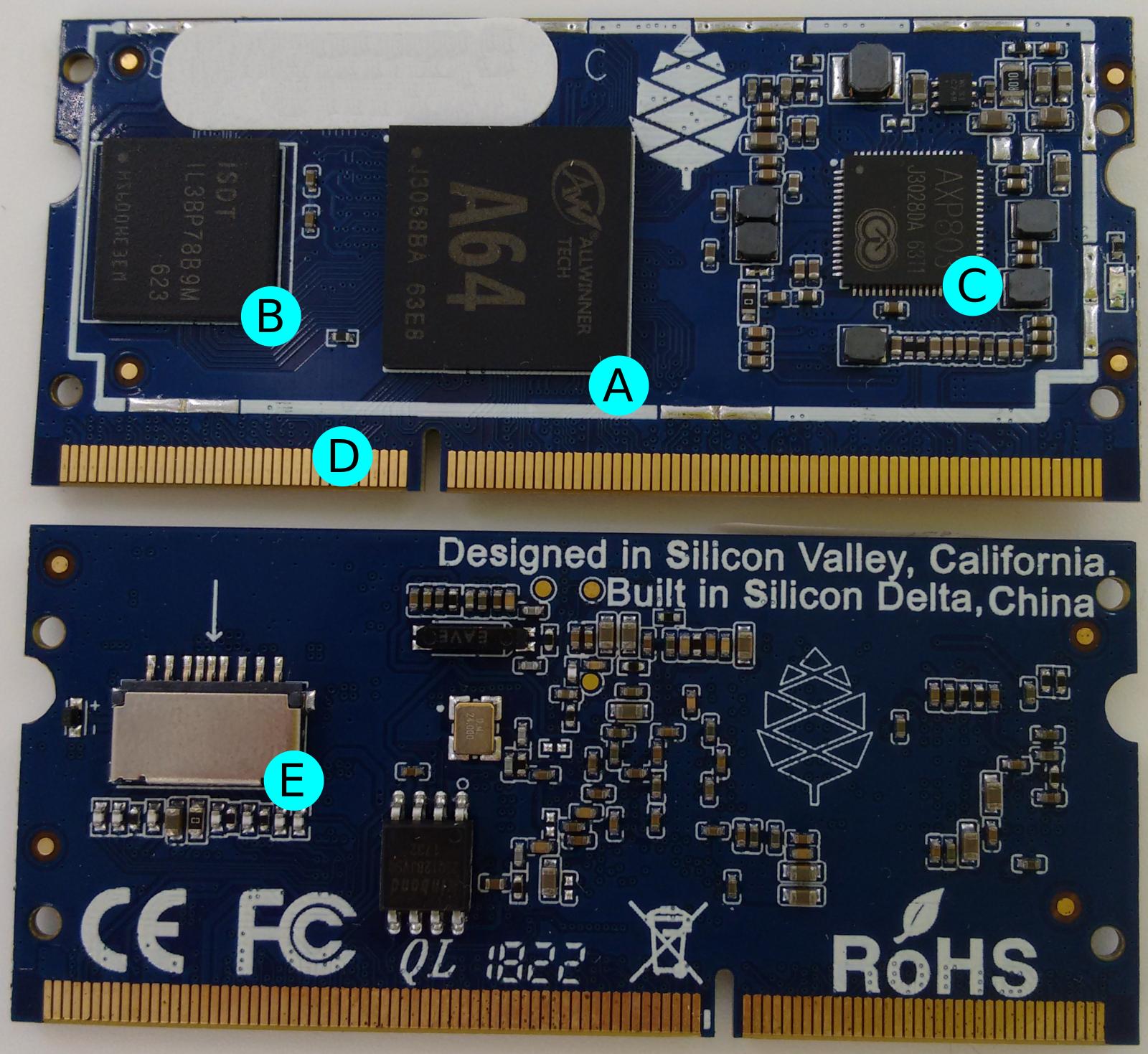Difference between revisions of "Clusterboard"
(→Frequently asked questions: Punctuation) |
(→Others: Cleanups) |
||
| Line 155: | Line 155: | ||
===Others=== | ===Others=== | ||
The current version of | The current version of NetBSD may have the networking issue solved in Armbian, as described above. | ||
==Frequently asked questions== | ==Frequently asked questions== | ||
Revision as of 09:43, 11 April 2021
The Clusterboard is a PINE64 board that makes it possible to set up a compact cluster of headless ARM-based single-board computers. It can hold up to a total of seven SOPine or SOEdge modules. The Clusterboard is an open-hardware project, but please note that it does not mean this project is "OSH" compliant.
Although there is a separate wiki page that describes SOPine modules, this page will describe both the Clusterboard and the SOPine modules. There is a user guide for the Clusterboard in this forum thread, but sadly the images have disappeared.
Specifications
These are the Clusterboard specifications, based on the product introduction:
- Standard mITX form-factor (167 mm x 170 mm)
- Built-in eight-port Gigabit Ethernet switch, using RTL8370N ASIC; the switch is unmanaged although the ASIC provides management functions, see this forum thread for further information
- Seven internal Gigabit Ethernet ports, one for each SOPine module, connected to the built-in switch using RTL8211E PHYs
- eMMC module slot, for the first SOPine module
- Seven USB 2.0 ports, one for each SOPine module
- GPIO pins exposed for each SOPine module, including the UARTs
- Gigabit Ethernet port activity LEDs, one for each SOPine module
- Battery holder for two standard AA 1.5 V batteries, for the real time clock (RTC) on all SOPine modules
- Barrel-style jack as a power input, 6.3 mm outer diameter and 3.0 mm inner diameter, for a 5 V / 15 A DC power supply
- Standard 24-pin ATX header as a power input, for an ATX power supply capable of providing at least 15 A at its 5 V output
Please note than only one power input may be used at once. The barrel-style jack is additionally protected by a built-in 15 A fuse.
Layout
| Label | Description |
|---|---|
| A | 6.3mm OD/3.0mm ID barrel type DC Jack for +5V 15A 75W power supply |
| B | Gigabit Ethernet Port |
| C | Reset Button |
| D | 2x 1.5V “AA” size Battery Holder for Real Time Clock Port (RTC) |
| E | eMMC connector (only for 1st module) |
| F | SOPine Module slot |
| G | USB2.0 USB-A plug |
| H | MicroUSB-B USB2.0 plug |
| I | Activity LED |
| J | 20-pin expansion connector |
| K | Lithium Battery 3-pin JST connector |
| L | RTL8211E Ethernet Port, with 2 status LEDs |
| M | Unmanaged Gigabit Ethernet Switch - RTL8370N |
| N | ATX Power Connector |
| O | ATX PS_ON 2-pin JST connector |
| P | HDD 5V Power (optional) |
| Q | Resistor (optional, for use with the alternative powering options) |
Parts F to L exist for each of all seven modules.
20-pin Connector
In the forum there is an image with the (likely) pinout.
SOPine Module
| Label | Description |
|---|---|
| A | A64 SoC |
| B | 2 GB of DDR3 RAM |
| C | AXP803 PMIC |
| D | Edge connector, the same as on SO-DIMM modules |
| E | microSD card slot |
| F (not annotated yet) | Power LED |
Accessories
- To operate this board you will need a power supply, Pine advises a "5V 15A power supply with 6.3mm OD/3.0mm ID barrel type DC Jack" which is also available in the store (EU/US versions). There are other ways to power this board, but they are not described here yet.
- The board works best when it is protected by a (mITX)case, and has some airflow provided by a fan.
- Each SOPine module can use cooling, both by a casefan, and by using heatsinks on the individual modules. At least the A64 could use some cooling.
- The first slot can use a eMMC module, which are in the store in 16GB/32GB/64GB/128GB sizes. The modules can be used as a USB stick using a USB adapter. (The eMMC is also readable with the Hardkernel eMMC to microSD converter.)
- Two AA batteries, to allow the SOPine nodes to retain the RTC (Real Time Clock) time and date information when the power is disconnected.
Installation
To install this cluster it is important to know which module has which IP address, so you can make sure you connect to the right board, esp with the module that has access to the eMMC.
You can plug in each module individually, and give them a separate name. After that is taken care of you will know which module is used for what. It would also be possible to manually edit each images hosts/hostname files before first boot.
Serial console
To boot use the serial console connect the pins to UART0 on the GPIO header and connect using baud 115200
- Pin 6: GND
- Pin 7: RTX
- Pin 8: TXD
The pinouts are available in the forum.
Operating systems
Armbian
To get the cluster running, start off with a basic Armbian SOPine install on the first module or directly on all the modules. Armbian offers Debian and Ubuntu as options for download.
There is an issue recognizing the network that needs you to make a change to the base image described here, and a PXE issue. If you have a good description, please add it here. The network issue has been resolved in Armbian builds post December 2020 - as described here.
As of February 2021 the current armbian image is not working (see the post on the arbian forum). The latest working version is 21.02.1. To update the system, the package 'linux-dtb-current-sunxi64' needs to be held back by running
echo "linux-dtb-current-sunxi64 hold" | sudo dpkg --set-selections
There are a number of possible basic installation methods.
- Full install on each module's mSD card.
- eMMC install on the first module.
- PXE boot for all modules, from the first module, or an external host.
Others
The current version of NetBSD may have the networking issue solved in Armbian, as described above.
Frequently asked questions
Q: Are the individual MAC addresses linked to the PHY chips, or the module?
A: The MAC address is specific to the SOPine module; swapping modules within the Clusterboard does not change the MAC address of the module.
Schematics and other
- Clusterboard version 2.2 Schematic Capture source file
- Clusterboard version 2.2 Schematic Capture PDF file
- Clusterboard version 2.2 PCB Job source file
- Clusterboard version 2.2 PCB Gerber file
- Clusterboard version 2.2 PCB Layout PDF file
- Clusterboard 20pins header definition
- Clusterboard 3D drawing in Fusion360
- Clusterboard PDF drawing
Hardware revisions
The current revision of the Clusterboard is 2.3; compared with the previous revision, 2.2, it removes the PCB components required for using lithium-polymer batteries for powering each of the modules. Besides the 2.2 revision, there was also an early revision (TO-DO: which exactly?) that required a hardware fix for the eMMC module to work properly.
Links
- https://www.pine64.org/clusterboard/ Clusterboard Introduction
- https://www.pine64.org/sopine/ SOPine Introduction
- https://pine64.com/product/clusterboard-with-7-sopine-compute-module-slots/ Store page for Clusterboard
- https://pine64.com/product/sopine-a64-compute-module/ Store page for SOPine module
- https://www.pine64.org/2020/02/03/fosdem-2020-and-hardware-announcements/ Mention of "Clusterboard with 4 SOEdge and 3 SOPine modules"
- https://www.pine64.org/2019/08/05/august-update-london-meetup-pinetab-news-soedge-and-more/ SOEdge Introduction


